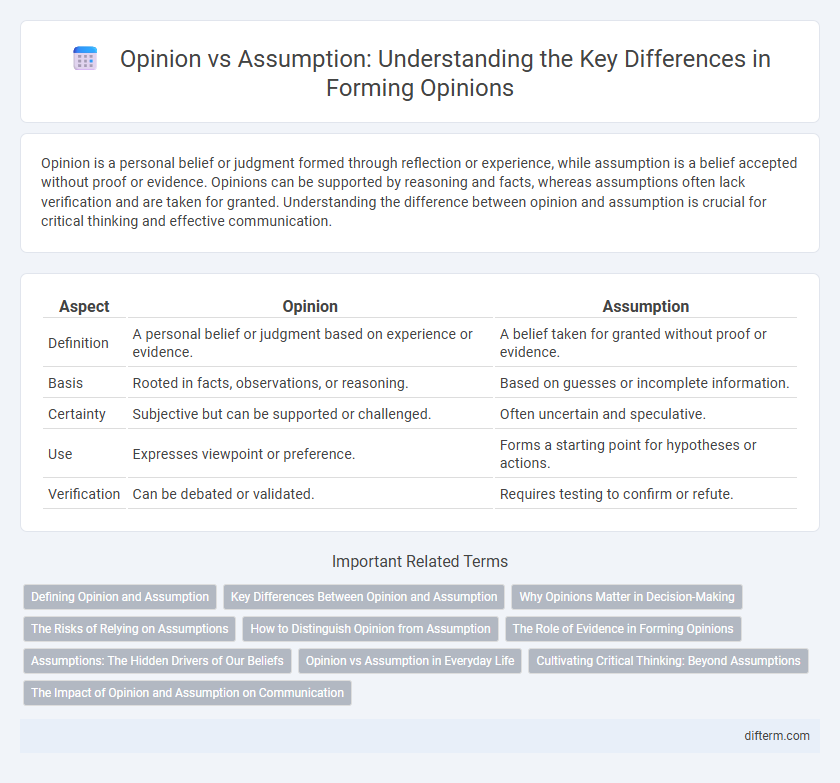Opinion is a personal belief or judgment formed through reflection or experience, while assumption is a belief accepted without proof or evidence. Opinions can be supported by reasoning and facts, whereas assumptions often lack verification and are taken for granted. Understanding the difference between opinion and assumption is crucial for critical thinking and effective communication.
Table of Comparison
| Aspect | Opinion | Assumption |
|---|---|---|
| Definition | A personal belief or judgment based on experience or evidence. | A belief taken for granted without proof or evidence. |
| Basis | Rooted in facts, observations, or reasoning. | Based on guesses or incomplete information. |
| Certainty | Subjective but can be supported or challenged. | Often uncertain and speculative. |
| Use | Expresses viewpoint or preference. | Forms a starting point for hypotheses or actions. |
| Verification | Can be debated or validated. | Requires testing to confirm or refute. |
Defining Opinion and Assumption
An opinion is a subjective belief or judgment formed based on personal experiences, feelings, or interpretations, often supported by evidence or reasoning. An assumption is a statement taken for granted without proof, serving as a starting point for further reasoning or argument. Understanding the distinction between opinion and assumption is essential for critical thinking and effective communication.
Key Differences Between Opinion and Assumption
An opinion is a personal belief or judgment formed based on facts, experiences, or reasoning, while an assumption is a belief accepted without proof or evidence. Opinions are subjective and often informed, whereas assumptions are speculative and lack verification. Understanding this distinction is crucial for critical thinking and effective decision-making.
Why Opinions Matter in Decision-Making
Opinions shape decision-making by providing personal insights and perspectives that assumptions often lack due to their speculative nature. Incorporating diverse opinions enhances the evaluation of options, reducing biases and improving outcomes. Understanding the distinction between opinion and assumption ensures more informed and thoughtful choices.
The Risks of Relying on Assumptions
Relying on assumptions instead of well-founded opinions risks misinterpretation and decision-making errors because assumptions often lack evidence and critical analysis. Opinions, grounded in experience and reasoning, provide a more reliable basis for judgment, reducing the chance of misunderstandings or misguided actions. Failure to distinguish between opinion and assumption can lead to flawed conclusions that impact personal and professional outcomes.
How to Distinguish Opinion from Assumption
Opinions are personal beliefs or judgments based on evidence, experience, or reasoning, whereas assumptions are beliefs accepted without proof or verification. To distinguish opinion from assumption, critically evaluate the basis of the statement: check for supporting facts and logical reasoning in opinions, while assumptions often lack explicit evidence. Clarifying the source and intent behind the statement helps identify whether it is an opinion reflecting subjective interpretation or an assumption taken for granted without validation.
The Role of Evidence in Forming Opinions
Opinions grounded in evidence provide a more reliable foundation for decision-making, distinguishing them from assumptions that lack factual support. Incorporating credible data and verified information enhances the accuracy and validity of opinions. Evaluating evidence critically helps avoid biases and unfounded conclusions, ensuring opinions are well-informed and rational.
Assumptions: The Hidden Drivers of Our Beliefs
Assumptions shape our beliefs by providing unspoken foundations that influence how we interpret information and form opinions. Unlike opinions, which are conscious expressions of judgment, assumptions operate below awareness, often leading to biased or unfounded conclusions. Recognizing and challenging these implicit assumptions is essential for developing more accurate, evidence-based beliefs and reducing cognitive distortions.
Opinion vs Assumption in Everyday Life
Opinions reflect personal beliefs shaped by experience and evidence, whereas assumptions are often unverified beliefs taken for granted without proof. In everyday life, relying on opinions encourages critical thinking and open dialogue, while assumptions can lead to misunderstandings and miscommunication. Distinguishing between opinion and assumption helps improve decision-making and interpersonal relationships.
Cultivating Critical Thinking: Beyond Assumptions
Distinguishing opinion from assumption is crucial for cultivating critical thinking, as opinions are informed viewpoints supported by evidence while assumptions are unverified beliefs taken for granted. Critical thinkers scrutinize assumptions to avoid cognitive biases and reach reasoned conclusions. Developing this skill enhances decision-making and promotes intellectual integrity in analyzing information.
The Impact of Opinion and Assumption on Communication
Opinion shapes communication by reflecting personal beliefs and experiences, offering subjective insights that can foster understanding or conflict. Assumption often leads to miscommunication by filling gaps with unverified beliefs, potentially causing misunderstandings and tension. Distinguishing opinion from assumption enhances clarity and reduces misinterpretation in interactions.
opinion vs assumption Infographic

 difterm.com
difterm.com